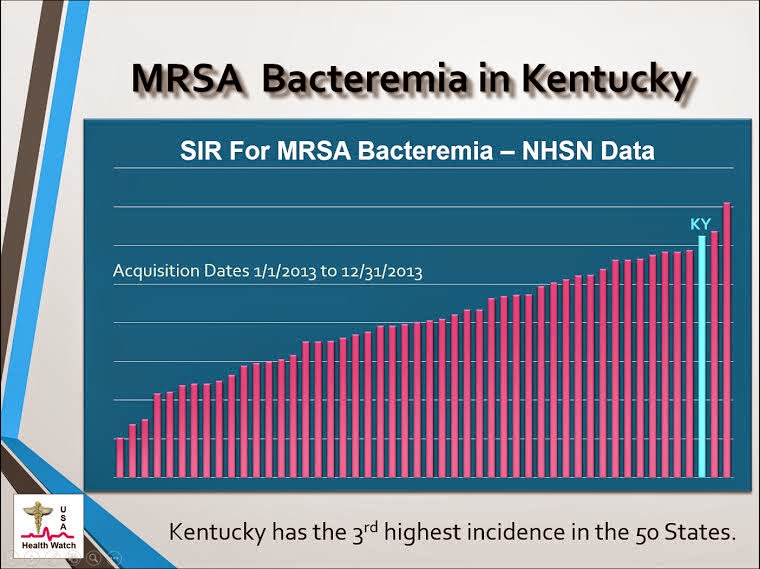New rule will improve reporting of antibiotic-resistant infections in health-care facilities, which are getting worse in Kentucky

Kentucky Health News
FRANKFORT, Ky. — Kentucky will have a new weapon, in the form of data, to fight infections acquired in hospitals and other health-care facilities, with legislative approval of a regulation that changes the way antibiotic-resistant infections such as MRSA and C. difficile are reported.
 |
| Health Watch USA chart, Centers for Disease Control data |
The new rule comes at a time when Kentucky has the third highest rate of MRSA bloodstream infections in the nation, according to the National Healthcare Safety Network. The state was ranked fourth last year.
Kentucky hospitals are 27 percent worse for MRSA (methicillin-resistant Staphylococcus aureus) and 21 percent worse for catheter-associated urinary tract infections than they were two years ago, according to the federal Centers for Disease Control‘s National and State Health-care Associated Infection Progress report.
The legislature’s Administrative Regulation Review Subcommittee approved the regulation, which has been in the works since 2008, at its Jan. 13 meeting. In the meantime, hospitals have succeeded in changing the term “hospital-acquired infections” to “healthcare-associated infections” to indicate that not all such infections occur in hospitals.
“The emergence of these dangerous organisms is really a problem of our entire heath care system and it can’t be fixed by any single facility or facility type,” Kevin Kavanagh of Somerset, chairman of Health Watch USA, a non-profit organization that promotes health care transparency and patient advocacy, told the committee. For his testimony, click here.
The regulation redefines HAIs and HAI outbreaks for infections, and requires simultaneous data reporting to the CDC and the state Department for Public Health. The CDC already has the data, but has “no authority” to act on it, while the state health department has the authority but not the data, Kavanagh wrote in an opinion piece for the Lexington Herald-Leader. “It is imperative that we know what is happening and where, so effective action can take place.”
He told the committee, “Data for action is critical. It is the first step to confront these dangerous organisms.”
The regulation also will require electronic reporting via the Kentucky Health Information Exchange beginning 2016. It now goes to Gov. Steve Beshear for final approval, which is expected.
Rep. Tom Burch, D-Louisville, chair of the House Health and Welfare Committee, told the joint House-Senate regulations committee that he had worked on the regulation for many years and that the Kentucky Hospital Association supported it. It had lobbied against such regulations. “There is nobody against it right now,” Burch said.
However, Sen. Alice Forgy Kerr, R-Lexington, said “This regulation seems to have caused a lot of indigestion for a lot of people,” and asked for a “statement of confirmation” from someone representing a group that might have opposed it in the past.
The hospital association’s vice president of government relations, Sarah Nicholson, was at the meeting but didn’t speak. Dana Stephens, director of infection prevention and control at St. Joseph East Hospital and St. Joseph Jessamine, told the committee, “I have had the great pleasure and honor of working with this multidisciplinary team for the past many years to really develop legislation and regulatory language that will provide information that will improve the health of those citizens we serve.”
Kerr commended the groups on reaching a compromise, but the elements of the compromise were unclear. Nicholson declined to comment after the meeting.
Kavanagh said afterward that the regulation is needed to reverse the apparent increase in hospital infections, based on the CDC data from 38 of the state’s 93 hospitals. “We are going in the wrong direction, with Kentucky 27 percent worse than it was two years ago,” he noted. “This regulation will help with that.”
 |
| Centers for Disease Control graphic reports Kentucky data on health-care-associated infections |
The regulation is expected to improve the accuracy of Kentucky’s HAI data because it requires all health-care facilities to submit reports and more clearly defines HAIs, which Kananagh said will help with under-reporting of infections.
New regulations often raise questions about the cost of enforcing them. Kavanagh told the committee that the CDC had told him that it would be allocating “a lot of federal money” to state health departments through grants to confront infectious disease issues, a result of the lessons learned from Ebola. Better HAI data will support Kentucky’s need for these grants, he said.
“So, I do believe the state health department, along with other entities, will have access to funds to implement this regulation change,” he said.